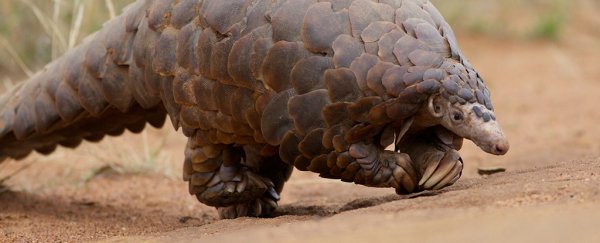The pangolin is the world's most heavily trafficked animal, and has been driven close to extinction by poachers.
Now a total trade ban on all pangolin species has been put in place at the Convention on the International Trade in Endangered Species (CITES) summit in South Africa in an attempt to secure the future of these scaly anteaters.
A bloc of 182 nations at CITES voted almost unanimously last week to protect pangolins with the ban, covering the Asian and African countries where the creature lives. Both its meat and its scales – which are used in traditional medicines – are in high demand in China and Vietnam.
"This decision will help give pangolins a fighting chance," said Susan Lieberman from the Wildlife Conservation Society. "The world is standing up for the little guy with this pivotal decision. These species need extra protection and now they will get it."
The trade ban, which is the strictest type enforced by CITES, covers all eight species of pangolin: four from Asia (Indian, Philippine, Sunda, and Chinese pangolins) and four from Africa (giant, tree, ground, long-tailed).
Scientists aren't sure how many pangolins are left in the wild, but with an estimated 100,000 individuals captured every year by illegal trade, researchers consider them at a serious risk of extinction.
Of the eight species of pangolin, two are listed as critically endangered on the IUCN Red List of Threatened Species, with two considered endangered, and four defined as vulnerable.
Pangolins live in hollow trees or burrows, and snack mainly on ants and termites. Unfortunately for the survival of their species, they're not difficult to catch – they just roll up into a ball when threatened.
While that tactic might defend them from natural predators, thanks to the protective scales covering their bodies, it's not much help against human hunters.
The ban comes not a moment too soon for the creatures. Last year between 3,000 and 4,000 frozen pangolins were seized by police in Indonesia – a haul that had a street value of around US$1.8 million.
It's not just the poaching that's a problem for the pangolin, because much of its habitat is under threat from deforestation too. But it's the human hunters and trade that are by far the biggest danger.
The good news is that efforts by CITES have worked in the past. The Cape mountain Zebra and the wood bison were both removed from the protective list this week because numbers are now healthy. Fingers crossed the same happens with the pangolin.
The animals are difficult to breed in captivity, because of their very particular diets and the environmental conditions they require, but conservationists are now beginning to see some success in breeding pangolins when carers can meet their naturalistic habitat.
Let's hope these breeding successes and the new CITES protections can help save the pangolin before it's too late.
"This is a perfect example of when the international community can come together for a species that truly needs help, and enacts strong, global regulations that can make a real difference," said Mark Hofberg from the International Fund for Animal Welfare (IFAW) after the decision was taken.
